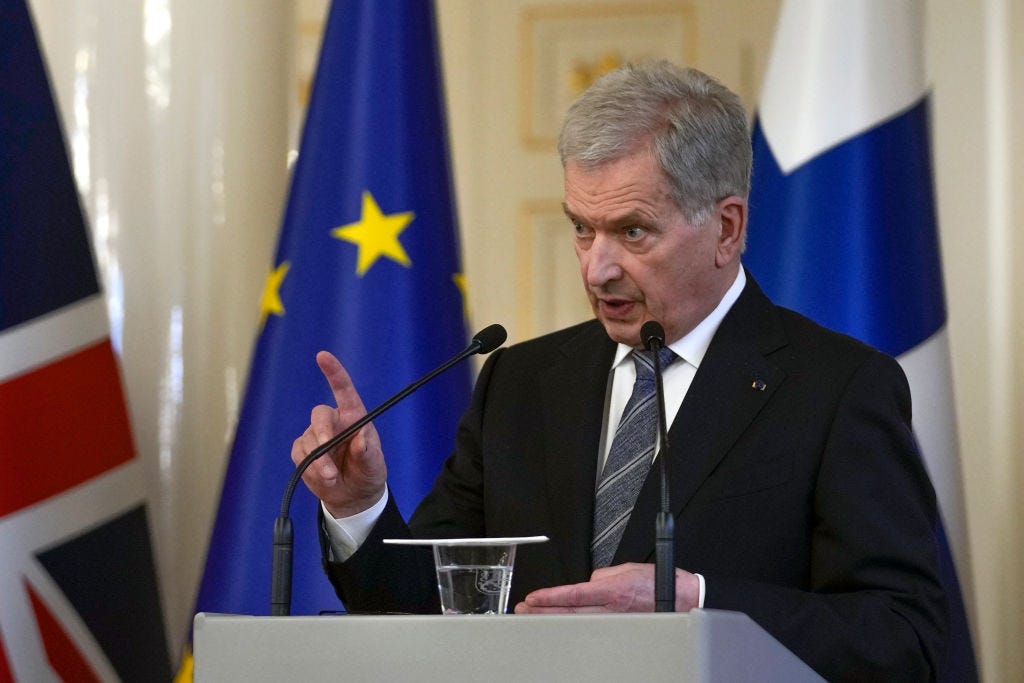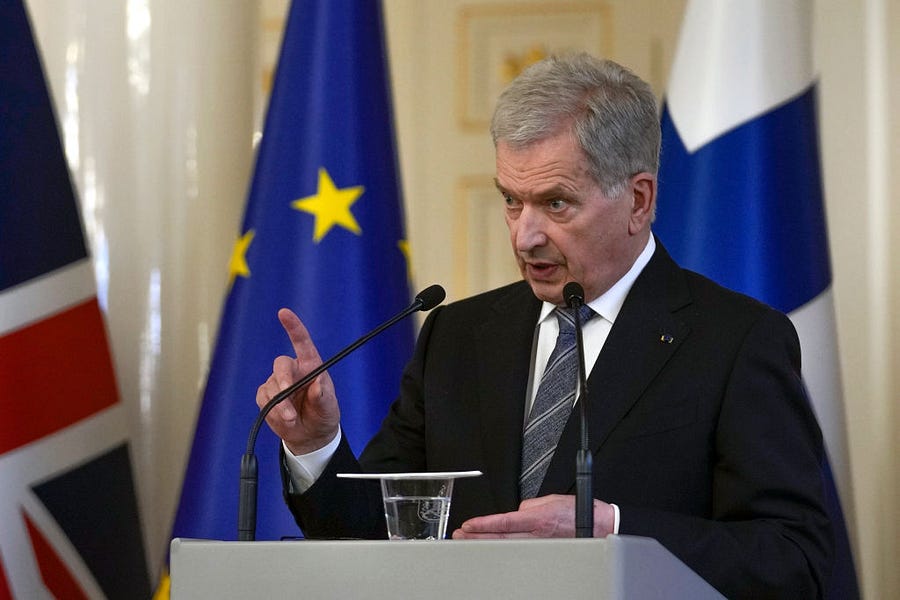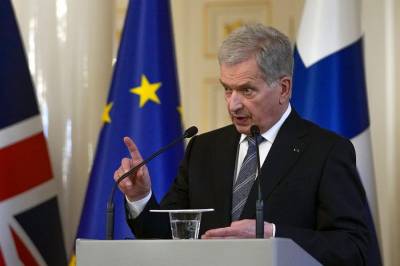Happy Monday. Our heart breaks for those who knew and loved the 10 people killed in Buffalo on Saturday.
With so much still unknown, we’re going to take another 24 hours to report and gather information on this tragic story as it unfolds.
Quick Hits: Today’s Top Stories
An 18-year-old gunman shot 13 people at a grocery store in Buffalo, New York on Saturday, killing 10 of them before being taken into custody and charged with first-degree murder. Eleven of the 13 people shot were black, and law enforcement officials purport to have found a 180-page document from the accused shooter detailing his racist motives for the massacre, which he attempted to livestream. The FBI is investigating the attack as both a hate crime and as racially motivated violent extremism.
Senate Minority Leader Mitch McConnell led a delegation of Republicans to Ukraine on Saturday—including Sens. Susan Collins, John Cornyn, and John Barrasso—that met with Ukrainian President Volodymyr Zelensky in Kyiv over the weekend. “The United States stands squarely behind Ukraine and will sustain our support until Ukraine wins this war,” McConnell said, pushing back against some of his party’s more isolationist voices. “America’s support for Ukraine’s self-defense is not mere philanthropy. … It is squarely in our national interest to help Ukraine achieve victory in this war and to help Ukraine and other countries deter other wars of aggression before they start.”
Israeli officials have launched an investigation into the clash that took place between Israeli police and Palestinian mourners at Palestinian-American journalist Shireen Abu Akleh’s funeral over the weekend. A police spokesman said the crowd of mourners had disrupted plans coordinated with Abu Akleh’s family in advance to load her casket into a hearse, and confirmed force was “subsequently used” after glass bottles and other objects were thrown. Abu Akleh’s brother Anthony, however, claimed police began to “attack” before the family had a “chance to get” the casket into the car. An initial Israeli investigation into the journalist’s death couldn’t conclude whether Israeli or Palestinian gunfire was responsible; Palestinian officials have thus far rejected an Israeli request to examine the bullet that killed her.
Pennsylvania Lt. Gov. John Fetterman—the leading Democratic candidate for the state’s U.S. Senate seat—announced yesterday he is recovering after suffering a minor stroke on Friday, just days before Pennsylvania’s primary. Fetterman says his doctors told him he didn’t suffer any cognitive damage, and that he’ll be able to get back on the campaign trail “sometime soon.”
Sen. Chris Van Hollen of Maryland also announced yesterday he had suffered a minor stroke earlier on Sunday. His doctors have advised him to remain under observation for “a few days,” but Van Hollen said in a statement he was told there will be “no long-term effects or damage as a result of this incident.”
Former President Donald Trump endorsed State Sen. Doug Mastriano on Saturday ahead of Tuesday’s Republican gubernatorial primary in Pennsylvania. Top Republicans in the state have been consolidating behind former Rep. Lou Barletta due to concerns about Mastriano’s electability—he was at the Capitol on January 6 and has appeared at QAnon-adjacent conferences—but Trump’s decision to wade into the race makes a last-minute Barletta upset of the frontrunning Mastriano a much greater challenge.
WNBA star Brittney Griner—who’s been detained in Russia since February after a cannabis vape cartridge was allegedly found in her luggage—had her pre-trial detention extended by a month on Friday, according to her lawyer. If convicted on the charges—which U.S. officials maintain are trumped up—Griner faces up to 10 years in prison.
It’s Official: Finland and Sweden Intend to Join NATO

Finnish President Sauli Niinistö called Russian President Vladimir Putin Saturday to share some information that must’ve led to an awkward chat: The Nordic country is planning to join NATO.
“The conversation was direct and straightforward and it was conducted without aggravations,” Niinistö said in a statement. “Avoiding tensions was considered important.”
On Sunday, Finland made it official, with final parliamentary approval expected within the week. Hours later, Sweden’s ruling party—reversing its long opposition—paved the way for a NATO bid of its own by announcing its support. This couldn’t have been the European realignment Putin had in mind when he invaded Ukraine.
In some respects, this isn’t much of a change. Finland and Sweden have long been generally aligned with the West, maintaining strong economic and diplomatic ties and even conducting joint military exercises with NATO. But the neighboring countries have also long opposed membership in the military alliance, valuing their independence. Finland—which shares an 800-mile border with Russia—used official military nonalignment to maintain a working relationship with Moscow, and Sweden’s ruling Social Democrats—dedicated to nuclear disarmament and global peace—have resisted joining the nuclear-armed defensive alliance.
Russia’s aggression quickly changed the equation. The invasion of Ukraine, former Finnish defense official Rasmus Hindren told The Dispatch, “has really affected two key pillars of Finnish security policy”—belief in the international rules-based order, and a bilateral relationship with Russia. “Now all that also has been thrown in the bin. With those two major changes, it just led to this shift in the policy and the widespread feeling that now would be a good time to join NATO. It’s not that people are afraid of any kind of imminent attack.”
Support for joining NATO has skyrocketed in Finland, from around 30 percent pre-invasion to 76 percent this month. In Sweden, it’s climbed above 50 percent. Both countries’ parliaments commissioned reports on the potential impact of joining NATO and concluded it would reduce the ultimate risk of war by adding deterrence against a Russian attack.
“Finland must apply for NATO membership without delay,” Niinistö and Finnish Prime Minister Sanna Marin said in a joint statement Thursday. Sweden’s government officially announced its bid Monday, Prime Minister Magdalena Andersson calling it “a historic change in our country’s security policy.” The Swedish Social Democrats did add on Sunday that if Sweden’s NATO bid is approved, the party will express “reservations against the deployment of nuclear weapons and permanent bases on Swedish territory.”
Some previous NATO bids have taken more than a year to get approved, but Sweden and Finland’s preexisting military strength and close ties to other NATO members—plus the jolt of urgency from the ongoing war in Ukraine–will likely put the countries on the fast track. NATO Secretary General Jens Stoltenberg said Thursday Finland “would be warmly welcomed into NATO, and the accession process would be smooth and swift.”
New members do need unanimous approval from all 30 NATO members, and Turkish President Recep Tayyip Erdoğan made clear this week his government is reluctant to see Sweden and Finland join. “We are following the developments regarding Sweden and Finland, but we don’t hold positive views,” he said. To win Turkey’s support, the country’s foreign minister argued Sunday, both Norden countries must stop holding official meetings with Kurdish groups Turkey considers terrorists and lift weapons-export bans on Turkey. But this is likely a negotiating tactic, and Stoltenberg said Sunday he’s sure the countries can work it out: “We’ll be able to find common ground, consensus on how to move on membership issues.”
There’s still Russia’s reaction to consider, since the mutual defense pact of NATO membership won’t kick in until Sweden and Finland are full members—Russia could decide to attack before then. “Russia will be forced to take retaliatory steps, both of a military-technical and other nature, in order to neutralize the threats to its national security that arise from this,” the Kremlin said in a statement.
But most analysts doubt Putin will expand an already unexpectedly difficult war. And Britain already committed last week to defend the two nations from any attacks. “These are not a short term stop gap,” said UK Prime Minister Boris Johnson, “but a long term commitment to bolster military ties and global stability, and fortify Europe’s defenses for generations to come.”
It’s more likely Russia will try cyber or misinformation attacks. “The more we keep raising awareness of these threats, the more it helps to drive the likelihood of those threats down,” Hindren said, noting that Finnish citizens’ media literacy and trust in Finnish authorities will help defend against disinformation. A Russian company did cut off Finland’s energy supply Saturday—but Russia has done the same to other countries over their refusal to pay in rubles.
However Russia reacts, Finland’s president underlined that Putin has only himself to blame for this bout of NATO expansion. “You caused this,” Niinistö said. “Look in the mirror.”
Worth Your Time
Reporting from Shevchenkove in Ukraine, Isabel Coles tells the story of Tymofiy Zozulia, a 12-year-old boy who became an orphan in March after Russian shelling killed his mother and stepfather. “Tymofiy received messages from classmates expressing sympathy for his loss, and asked his aunt what had happened, she recalled. Perhaps his house had been damaged by shelling, Ms. Strilets told him. ‘How do you tell the kids their parents are gone?’” Coles writes in The Wall Street Journal. “In the end, it was [his brother] Serafim who revealed the truth. ‘Mum and dad were killed,’ declared the boy, according to Strilets. Tymofiy asked his aunt if it was true. She said it was. On March 18, Tymofiy scribbled in red [in his diary of the war], with a drawing of a devil shooting sparks from its eyes. ‘I found out what happened to my mum and Sirozha. They were killed!’ wrote Tymofiy. ‘Auntie Lena hid this until the very last moment.’ The following day, he received another blow. ‘Today my dog Bonya died because of the shelling. He was killed by a fragment of the enemy’s shell,’ Tymofiy wrote. ‘The shell itself struck my friend lllia Tyshchenko’s fence. The shrapnel damaged a lot; our neighbor’s fence…; a tree, our fence.’ In the margin, he wrote: ‘Dreams don’t come true.’”
Jonathan Malesic, a professor at Southern Methodist University, is worried about the long-term effects pandemic-era accommodations will have on his students. “By several measures—attendance, late assignments, quality of in-class discussion—[my students last fall] performed worse than any students I had encountered in two decades of teaching. They didn’t even seem to be trying,” he writes for the New York Times. “The pandemic certainly made college more challenging for students, and over the past two years, compassionate faculty members have loosened course structures in response: They have introduced recorded lectures, flexible attendance and deadline policies, and lenient grading. In light of the widely reported mental health crisis on campuses, some students and faculty members are calling for those looser standards and remote options to persist indefinitely, even as vaccines and Covid therapies have made it relatively safe to return to pre-pandemic norms. I also feel compassion for my students, but the learning breakdown has convinced me that continuing to relax standards would be a mistake. Looser standards are contributing to the problem, because they make it too easy for students to disengage from classes.”
In a piece for National Review, Dominic Pino argues the Biden administration’s belated response to the baby formula shortage is not only inadequate, but quite possibly counterproductive. “The FDA should announce that baby formula that is currently approved in Europe is now approved here, and the administration should use its executive authority to eliminate trade barriers with Europe and ask Congress to do the same,” he writes. “That agency is not going to suddenly become a nimble deregulator overnight, and in all likelihood, American mothers who want European baby formula will still be buying it on black markets a year from now. The rest of the White House’s plan is simply unhelpful. It says that the FTC and state attorneys general will go after ‘price gouging or unfair market practices.’ Part of the reason the market got to this point is government interference with price signals, so promising more government interference with price signals, which is what this part of the plan means in practice, is not the answer.”
Presented Without Comment
Also Presented Without Comment
Toeing the Company Line
Friday’s Uphill (🔒) touches on January 6th Committee subpoenas, the China competition bill conference committee, and some Republicans’ opposition to Ukrainian aid. “Lawmakers from both parties have largely been in agreement on the congressional response to the war, but the vote this week saw more Republicans breaking away than prior votes,” Haley writes. “All 57 votes against the aid bill came from Republicans. They had varied reasons for doing so, but it revealed new rifts in the GOP’s appetite for prolonged involvement in the war.”
Jonah’s latest G-File situates the inflation we’re experiencing today—and the Biden administration’s response to it—in American history. “Inflation is panic inducing. It makes people feel like things are out of control, that their leaders are in over their heads, and that their economic future is imperiled,” he writes. “And when you’re all jangly with fear and the sense that powerful forces are buffeting you, you’re more likely to be freaked out by other stuff, too.”
David’s Sunday French Press attempts to tease out the distinction between being anti-abortion and what he calls an abortion abolitionist. The pro-life movement “must not imprison mothers. It must not order them to face death for the sake of pregnancies that will fail,” he argues. “Even if Americans are uncomfortable with abortion, our nation will never agree to protect unborn children by punishing their mothers, and an ‘abolitionist’ movement that tells them they must is an abolitionist movement that’s doomed to fail.”
Deputy managing editor Michael Reneau made his Dispatch Podcast debut! On Friday’s episode, he joined Sarah, David, and Jonah for a conversation about inflation, baby formula shortages, abortion politics, and divides within the evangelical church.
In a rare Saturday episode of Advisory Opinions, David and Sarah discuss the latest developments in Republican governors’ efforts to regulate social media, the legality (or illegality) of picketing at people’s homes, and answer some listener questions.
On the site today, Chris Stirewalt examines Donald Trump’s party metamorphosis from 2016 outsider to today’s establishment kingpin, while Rebeccah Heinrichs and Bryan Clark detail the types of military aid the U.S. should send Ukraine in order to help them not just endure Russian aggression but push Russia back and end the war.
Let Us Know
Can you think of a bigger geopolitical own-goal throughout history than Putin’s invasion directly causing Sweden and Finland to join NATO?
Correction, May 16, 2022: Iratxe García Pérez is a member of the European Parliament







Please note that we at The Dispatch hold ourselves, our work, and our commenters to a higher standard than other places on the internet. We welcome comments that foster genuine debate or discussion—including comments critical of us or our work—but responses that include ad hominem attacks on fellow Dispatch members or are intended to stoke fear and anger may be moderated.
With your membership, you only have the ability to comment on The Morning Dispatch articles. Consider upgrading to join the conversation everywhere.